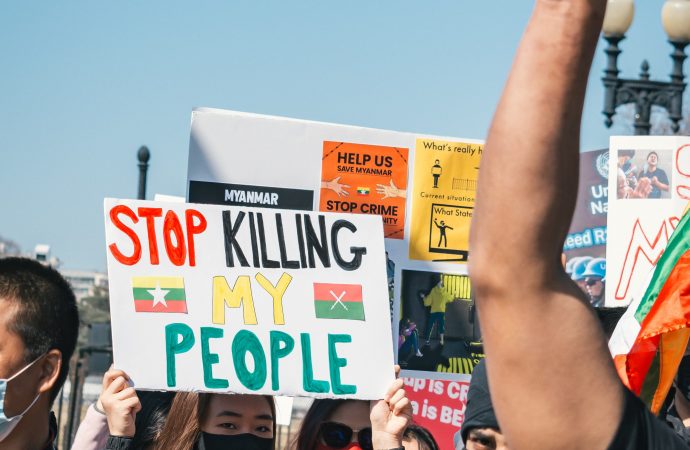By John Packer
Director of the Human Rights Research and Education Centre at the University of Ottawa and Neuberger-Jesin Professor of International Conflict Resolution
Finally, the United Nations Independent International Fact-Finding Mission on Myanmar has stated the obvious: the Rohingya ethnic minority has been subjected to genocide. The UN Mission identified four of the five acts of genocide and named a handful of generals at the top of the Myanmar Armed Forces as largely responsible.
This is woefully late in coming. Expert bodies have been detailing the violations for years. The Washington-based NGO Genocide Watch has been issuing emergency alerts for the Rohingyas since 2012. More to the point, from the comfort of our homes we could see the violations taking place through satellite technology as hundreds of villages were razed to the ground and built over with new military bases, commercial investments, and new villages to resettle non-Rohingya communities.
So far, Canada has responded with some strong expressions of concern, appointed a Special Envoy to study the unfolding situation, agreed to significant humanitarian assistance for the refugees, listed some individuals for sanctions in Canada, and indicated some unclear diplomatic efforts. This is all welcome, but simply fails to respond to the dire need for protection of the half million or so Rohingyas remaining in Myanmar, many barely surviving in forced camps and many more facing an uncertain fate. And it does nothing to repair the wrongs in terms of restitution, compensation, or protected return.
Indeed, there has been no change inside Myanmar, other than erecting a fence along the Bangladesh border, dotted with armed guards, to ensure no returns. The ongoing genocide, it seems, is running its course — arguably nearing completion of the “unfinished business” of Myanmar “clearance operations” in the words of Myanmar’s top General Min Aung Hlaing.
In light of the UN Mission’s report, we should hesitate no more. With the Government of Canada claiming to uphold a “rules based international order” and especially to stand for human rights, “feminism,” etc., there should be no moral equivocation. If one is hesitant in the face of genocide — the most egregious breach of human rights and basic humanity — then there can be no confidence or trust in judgement or commitment, much less leadership. Matters of genocide demand clarity of mind, position, and expression — and action. Much in the world is troubling, but we cannot waver in the face of genocide. We must know it when we see it, we must name it, and we must act. That is the clear lesson of history.
It is also the minimum requirement of the law — the 1948 Convention on the Prevention and Punishment of Genocide — to which Canada is a State Party. We are bound not only not to commit genocide ourselves, but to its prevention and punishment. As such, the least we must do is recognize it and call it out.
As a matter of law, the provisions of the Convention are clear; the standard of proof, as for other conventions, is the balance of probabilities (or, as per the International Court of Justice, “reasonable certainty”). Prima facie, there is abundant evidence (testimonial, documentary, physical) establishing genocide against the Rohingyas; we see it with our own eyes every day. Against the mountain of evidence, the persistence of the Government of Myanmar — in its policies, laws, programs, practices, and statements — clinches “reasonable certainty.” The genocide is not the result of chance, bad luck or a natural disaster. Rather, the Government of Myanmar is solely responsible for genocide against the Rohingya people.
Stopping the ongoing genocide and other violations in Myanmar requires holding the state responsible, which cannot be achieved through prosecution of individuals. Leaving aside the hugely problematic aspects of that narrow approach, criminal conviction in international law entails no reparation — not that any individual is capable of repairing, compensating, or taking responsibility for the overall situation vis-à-vis the Rohingya population.
Only the State of Myanmar itself can restore the Rohingyas’ citizenship. Only the state can return titles to their expropriated property. Only the state can reverse laws that impinge on Rohingya rights and protect their fundamental freedoms individually and collectively. Moreover, the state can act swiftly if it is persuaded to do so. By contrast, pursuing individual culpability would take years, if not decades — if one could ever arrest anyone to prosecute.
Of course, we are all in favour of pursuing those individuals responsible for international crimes. They must be held to account. But sober evaluation of the situation and the options shows that is not a solution to the immediate core problem.
The Government of Canada is in a good position to act — even to lead. We are hardly invested in the situation and thus unlikely to encounter serious repercussions. Canada should invoke the Genocide Convention, perhaps by mobilizing like-minded states to initiate a contentious litigation. Myanmar has already accepted that possibility. A less confrontational approach would be to act through the UN General Assembly or other body to request an Advisory Opinion from the International Court of Justice. Either approach would generate significant political pressure and be entirely consistent with Canada’s commitment to a “rules based international order.”
Such leadership would also be a politically defensible path for the Liberal Party of Canada, since Lester B. Pearson, then Canadian Secretary of State for External Affairs, signed the Genocide Convention in 1949. One would think Justin Trudeau, Chrystia Freeland, and other Liberals would be proud to uphold that legacy and use the very Convention Pearson signed with undoubted conviction and moral resolve.
More importantly, based on meaningful action by the international community to confront Myanmar and find a durable and just solution, the Rohingyas would begin to see some light for their future.










